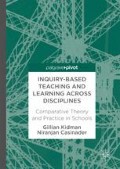Abstract
The Future Problem Solving (FPS) Program is used as a case study that explores the ways in which a teacher/coach contributes to the effective inquiry-based education of a student. A high degree of expertise on the part of the teacher/coach is essential for successful inquiry-based learning to take place in the classroom. The inquiry literate teacher/coach facilitates the development of the students’ inquiry literacy through three process phases (the exploratory, the evidence gathering and the sense making), whilst undertaking seven distinct teaching/coaching roles (direct instructor, facilitate interpretation, discussion facilitator, mentor, organiser, questioner and logistics organiser). The role of Information Communication Technology on the teacher role of data selection is explored.
Access this chapter
Tax calculation will be finalised at checkout
Purchases are for personal use only
References
Assay, L. D., & Orgill, M. (2010). Analysis of essential features of inquiry found in articles published in the science teacher, 1998–2007. Journal of Science Teacher Education, 21(1), 57–79.
Casinader, N. (1995). Challenging the thinking process: The future problem solving program. Unicorn, 21(1), 56–65.
Casinader, N. (1999). Education for the new millennium: The future problem solving program in Australia. Learning Matters, 4(1), 48–50.
Casinader, N. (2014). Culture, transnational education and thinking: Case studies in global schooling. Milton Park, Abingdon: Routledge.
Crabbe, A. B. (1989). The future problem solving program. Educational Leadership, 47(1), 27.
Future Problem Solving Program Australia. (2008). Coaching guide Australian version: 7th Edition (7th ed.). Melbourne: Future Problem Solving Program Australia.
Future Problem Solving Program Australia (Producer). (2014). The future problem solving program. [introductory video].
Future Problem Solving Program Australia. (2015). Evaluator handbook (7th ed.). Melbourne: Future Problem Solving Program Australia.
Future Problem Solving Program International. (2017a). Affiliate Directory. Retrieved from http://www.fpspi.org/FindAD.html.
Future Problem Solving Program International. (2017b). Welcome. Retrieved from http://www.fpspi.org/index.html.
Future Problem Solving Program International (FPSPI). (2016a). Coach’s handbook. Melbourne: Future Problem Solving Program International (FPSPI).
Future Problem Solving Program International (FPSPI). (2016b). Evaluation guidelines for community problem solving 2016–2017. Melbourne: Future Problem Solving Program International (FPSPI).
Future Problem Solving Program International (FPSPI). (2016c). Evaluation guidelines for global issues problem solving 2016–2017. Melbourne: Future Problem Solving Program International (FPSPI).
Kidman, G. C. (2016). Extending the gifted science student: What the teacher needs to know during enquiry based teaching. In K. S. Taber & M. Sumida (Eds.), International perspectives on science education for the gifted: Key issues and challenges. Abingdon: Routledge.
Queensland Studies Authority (QSA). (2004). Biology senior syllabus 2004 (amended 2006 and 2014). Brisbane: Queensland Studies Authority (QSA).
Rogalla, M., & Margison, J. (2004). Future problem solving program coaches’ efficacy inteaching for successful intelligence and their patterns of successful behavior. Roeper Review, 26(3), 175.
Volk, V. J. (2003). Confidence building and problem solving skills: An investigation into the impact of the future problem solving program on secondary school students’ sense of self-efficacy in problem solving, in research, in team work and in coping with the future. PhD unpublished doctoral thesis, University of New South Wales‚ Sydney.
Walker, C. & Shore, B. (2015). Understanding classroom roles in inquiry Education: Linking role theory and social constructivism to the concept of role diversification. Sage Open 5(4), 1-13.
Author information
Authors and Affiliations
Corresponding author
Copyright information
© 2017 The Author(s)
About this chapter
Cite this chapter
Kidman, G., Casinader, N. (2017). Managing the Reins of Inquiry: The Role of the Teacher in IBL. In: Inquiry-Based Teaching and Learning across Disciplines. Palgrave Pivot, London. https://doi.org/10.1057/978-1-137-53463-7_2
Download citation
DOI: https://doi.org/10.1057/978-1-137-53463-7_2
Published:
Publisher Name: Palgrave Pivot, London
Print ISBN: 978-1-137-53462-0
Online ISBN: 978-1-137-53463-7
eBook Packages: EducationEducation (R0)

